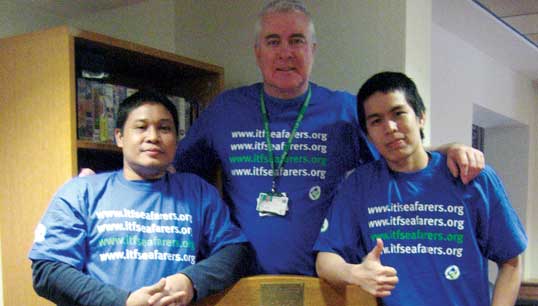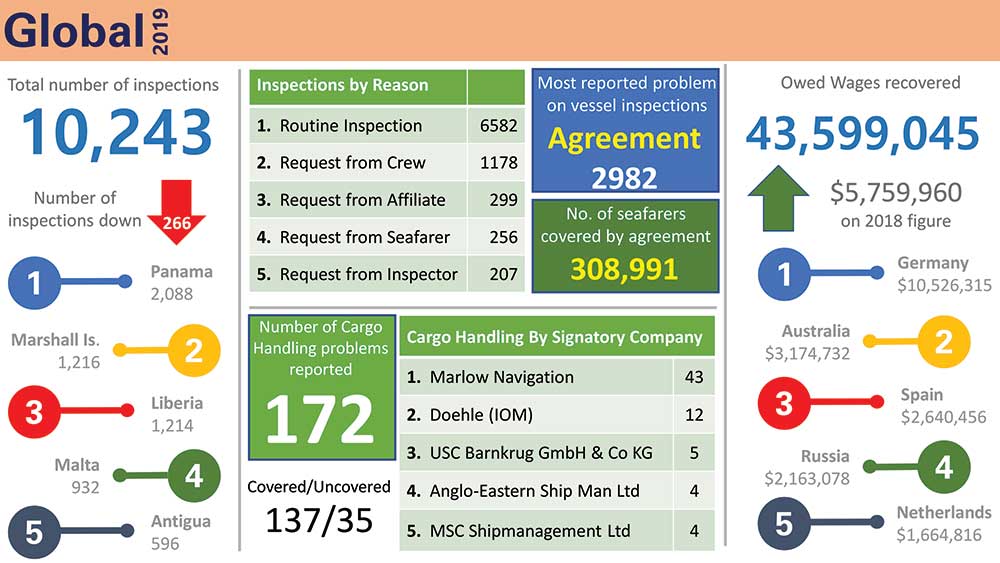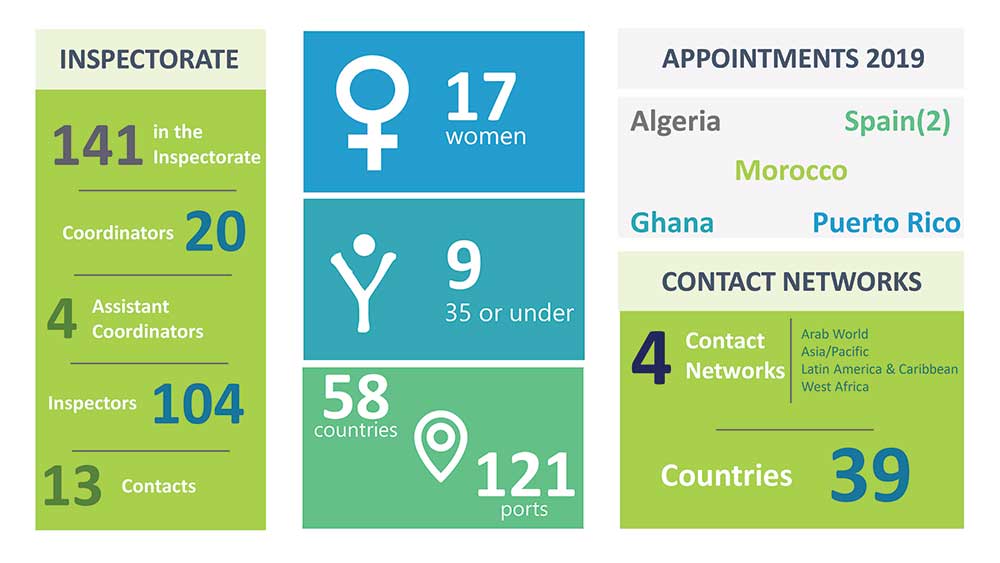Still serving seafarers – an ITF inspector adapts to life under the Covid-19 pandemic
22 May 2020

The ship inspectors of the International Transport Workers' Federation (ITF) provide an essential service to the world's seafarers, seeking swift justice for crews abandoned without pay or working in abysmal conditions. ITF inspectors are needed as much as ever during the Covid-19 pandemic, but as Tommy Molloy writes, they've had to come up with some new ways of working
The coronavirus pandemic has completely changed the way the International Transport Workers' Federation (ITF) Inspectorate are able to work during the 'lockdown'.
In normal circumstances, the job hinges on us boarding ships, talking with the crew, and physically inspecting the working environment and the documents that relate to the crew's employment. Ship cabins, offices, passageways and so on couldn't be described as spacious, and to do the job properly you are often up close and personal.
We haven't been able to do any of that.
Like most ITF Inspectors around the globe, I am required to comply with government social distancing requirements. I am not considered a key worker. So I am unable and frankly unwilling to inspect ships and jeopardise both crew onboard and my family and community during this period.
Last year, the ITF's 135 Inspectors worldwide carried out 10,243 ship inspections and recovered $43.6 million in unpaid wages for seafarers. That was before this pandemic had been unleashed. There is a school of thought that suggests the fallout – when most of us will be getting used to the 'new normal' – will be unprecedented for seafarers in terms of numbers who go unpaid, are left abandoned and so on. Many companies are already going broke. We all feel we are about to be extremely busy.

In the meantime, we continue to deal with and try to resolve the same problems remotely.
For example, the collective pressure of a few Inspectors resulted in four Chinese seafarers with expired contract extensions being successfully repatriated from Liverpool recently.
They had to return to the ship twice due to flight cancellations before striking lucky. The company, which had done all it could to facilitate their repatriations, subsequently wrote to inform us they had eventually safely arrived in China but were now quarantined in hotels away from their families – who had remonstrated with the company for risking their health by possible exposure to the virus at airports, on planes and trains. Sometimes you can't do right for doing wrong.
I am also dealing with two abandoned Lithuanian seafarers in Birkenhead. Their ship arrived in January and was detained by MCA/Port State Control for many deficiencies – including no usable lifeboat, no charts, no MF radio comms, no laundry facilities, and no Personal Protective Equipment (PPE).
I eventually got two ABs paid and repatriated, but the remaining captain, chief engineer and chief officer declined assistance. The captain and chief engineer eventually left, and a new chief engineer arrived at the beginning of March on a two week contract. He is still here and contacted me for assistance because he hasn't been paid any wages or his travel expenses to get here.
The company occasionally sends money equivalent to £3.75 a day each for three square meals. They walk three miles each way to a Tesco supermarket to buy food that has been reduced in price. None of the deficiencies have been rectified. Airports in Lithuania are closed.
Negotiations carry on via virtual means – as with a video conference call I had recently with Peel Ports and Unite the Union regarding crew carrying out lashing work in Liverpool.
I am also working on a virtual training session I have been asked to do for the ITF Trust on the ITF FOC Campaign and worldwide inspectorate. The training is for five Trust-sponsored World Maritime University students from various African countries with varied interests, from port management to transposition of international conventions into national law, problems for seafarers of illegal migration, ferries and now Covid-19.
The ITF inspector challenges
Figures show the scale of ITF inspectors’ global challenge.
The International Transport Workers’ Federation (ITF) has reported a large year-on-year increase in the ‘owed wages’ its ship inspectors have recovered for crews.
However, the ITF says that the $5,759,960 increase between 2018 and 2019 is mainly due to the collapse of one company rather than a spike in poor employers. That company, Vega-Reederei, owed wages to seafarers on 25 vessels, but cooperated with inspectors throughout the process of recovery.
The newly-released figures for 2019 show that the total wages recovered in the year amounted to $43,599,045. This represents thousands of seafarers around the world who were not paid by their employers and were often abandoned in port until the ITF inspectors came to their aid.
The number of ITF inspectors increased in 2019, with inspectors appointed for the first time in Algeria, Ghana and Morocco. Inspections took place in 121 ports in 58 countries.
Overall, there are now 141 people in the worldwide ITF inspectorate, of whom 104 are inspectors, 20 are coordinators, four are assistant coordinators and 13 are contacts.
Two of the ITF inspectors in the UK are Union officials seconded from Nautilus: Tommy Molloy, who is based in Liverpool, and Paul Keenan, based in Hull.
Inspectors work under the aegis of the ITF Flag of Convenience (FOC)
Campaign, which has two elements:
• a political campaign aimed at eliminating the flag of convenience system by achieving global acceptance of a genuine link between the flag a ship flies and the nationality or residence of its owners, managers and seafarers
• an industrial campaign designed to ensure that seafarers who serve on flag of convenience ships, whatever their nationality, are protected from exploitation by shipowners.
I was invited to be a guest blogger for the Merseyside Maritime Museum website and have written a piece titled 'Fatigued, Fearful and Far from Home' on the seafarer repatriation crisis.
I have also been asked to re-write and update a number of ITF Fact Sheets.
It isn't the same as inspecting ships and meeting seafarers', but it is still interesting and busy. Anyone with a trade union background knows that a time of crisis affecting members' livelihoods is when things get really busy.

More people than ever call on their union for assistance and more want to join. It's the same here; some people who were adamant they didn't need ITF help a couple of months ago suddenly realise how wrong they were and wished they'd paid heed.
Many people will be wishing they'd joined a relevant trade union before this crisis hit. Hopefully it is a message that will be absorbed by non-trade union members throughout the maritime sector.
Tags
